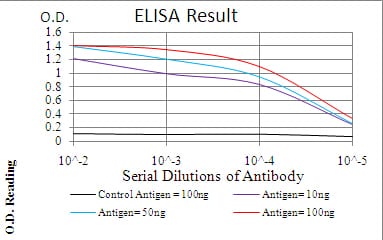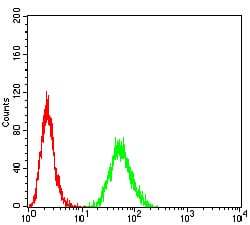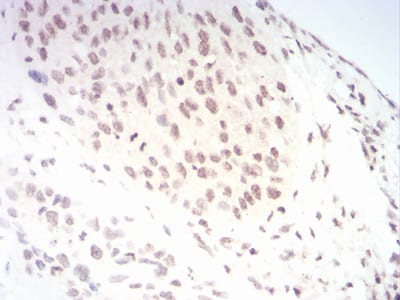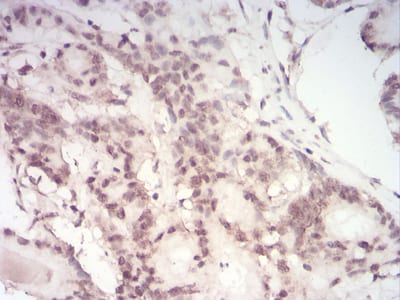



| WB | 咨询技术 | Human,Mouse,Rat |
| IF | 咨询技术 | Human,Mouse,Rat |
| IHC | 1/200 - 1/1000 | Human,Mouse,Rat |
| ICC | 技术咨询 | Human,Mouse,Rat |
| FCM | 1/200 - 1/400 | Human,Mouse,Rat |
| Elisa | 1/10000 | Human,Mouse,Rat |
| Aliases | TP2; TRT; CMM9; EST2; TCS1; hTRT; DKCA2; DKCB4; hEST2; PFBMFT1 |
| Entrez GeneID | 7015 |
| clone | 3H2G9 |
| WB Predicted band size | 127kDa |
| Host/Isotype | Mouse IgG1 |
| Antibody Type | Primary antibody |
| Storage | Store at 4°C short term. Aliquot and store at -20°C long term. Avoid freeze/thaw cycles. |
| Species Reactivity | Human |
| Immunogen | Purified recombinant fragment of human TERT (AA: 1029-1132) expressed in E. Coli. |
| Formulation | Purified antibody in PBS with 0.05% sodium azide |
+ +
以下是关于TERT抗体的3篇参考文献及其简要摘要:
---
1. **文献名称**: "Detection of TERT promoter mutations in primary and recurrent glioblastoma by immunohistochemistry"
**作者**: Arita H, et al.
**摘要**: 该研究开发了一种基于TERT抗体的免疫组化方法,用于检测胶质母细胞瘤中TERT启动子突变状态。结果显示,抗体染色强度与突变状态高度相关,为临床提供了一种快速、低成本的检测手段。
---
2. **文献名称**: "TERT antibody validation for immunohistochemical analysis of human tumors"
**作者**: Vinagre J, et al.
**摘要**: 研究验证了商业TERT抗体的特异性,发现其在多种肿瘤(如黑色素瘤、肝癌)中可有效标记TERT蛋白表达。同时发现TERT高表达与患者预后不良相关,支持其作为潜在治疗靶点。
---
3. **文献名称**: "Utility of anti-TERT antibody in identifying ALT-positive gliomas"
**作者**: Lee Y, et al.
**摘要**: 通过TERT抗体染色结合端粒长度分析,研究者发现TERT阴性胶质瘤常伴随端粒替代延长机制(ALT),提示抗体检测可用于区分不同端粒维持机制的肿瘤亚型。
---
这些研究均聚焦TERT抗体在肿瘤诊断、分型及预后中的应用,部分涉及抗体特异性验证和临床转化潜力。如需具体年份或期刊信息,可进一步补充检索。
×